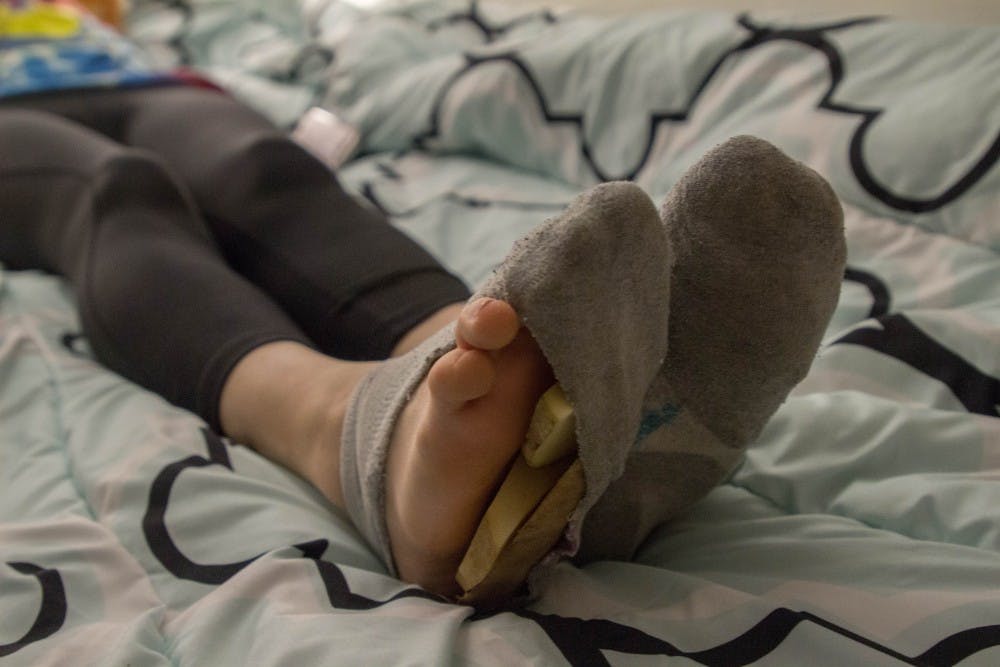Everyone has their preferred methods of relieving flu symptoms. Some turn to teas and other drinkable concoctions, some turn to vegetables, but most everyone has some family-tested remedy for battling their illness.
As flu season rose up in February, some students turned to these remedies in hopes of avoiding absences or making their classmates sick.
Lisa Jaurigue, a clinical assistant professor in the College of Nursing and Health Innovation, said that the purpose of nursing is to "care for the human response to illness in the environment" and that helping patients navigate home remedies is a part of her job.
She answered questions about a list of home remedies and spoke to the importance of the mind in overcoming sickness.
Herbal teas, citrus teas, teas in general
Many people turn to teas for comfort and relaxation, even outside of sickness, but some swear by it when trying to heal or avoid flu season.
Jaurigue said there is some merit to these as a remedy. The extra fluids and the warmth of the tea may help to soothe the body, but that the herbal effects of chamomile or citrus teas may relax the stomach and solve a stomach ache.
"I think it's a combination of the increase of fluids, the warmth and the third piece – that's very powerful – what they think is going to happen," Jaurigue said.
Potatoes, Onions, Garlic or other vegetables on the foot
During the era of the Black Plague, many believed that onions held the power to fight off disease and death. That myth, combined with Chinese method of reflexology, led many to start putting onion slices in their socks while they slept. Eventually, this branched out to potatoes and garlic, but none of these methods hold any proven value according to Jaurigue.
"According to the Center for Disease Control, there's no real strong evidence that garlic, oil of oregano ... that those types of things really help," Jaurigue said. "There's other things that we can do that are tried and have some evidence behind it, versus those home remedies."
Strong alcohol for sinus relief
Certain traditions and cultures believe that taking a shot of strong alcohols, like "moonshine" or vodka, can help with sinus relief.
Jaurigue said that this 21-and-up remedy might have some value, but certainly not from a research standpoint.
"That's probably the alcohol component in it. As a nurse, we'd have to look at the situatution surrounding it, I would probably not recommend alcohol for people under 21 years of age," Jaurigue said. "I have family members too who swear by that – probably the heat. The alcohol will just clear up sinuses, but that would make me a little bit nervous for the college population."
Apple cider vinegar, cayenne or black pepper
Many people use apple cider vinegar for a host of solutions, everything from weight loss to acne to flu remedy. Some who prefer holistic methods swear by it. Similarly, cayenne and black pepper are thought to be natural antibiotics.
Many of these remedies fall under a similar theme, Jaurigue said.
"The evidence isn't strong. It's not recommended on a lot of the sites – credible internet sites," Jaurigue said. "You can probably find a lot of home remedies, but you really have to check the credibility of the author."
Essential oils and the power of the mind
While many of these solutions and remedies remain unfounded in research, Jaurigue iterated the importance of listening to patients and knowing what may help them – including the unfounded home remedies.
"There are some remedies that I really believe if a person believes in their mind or their thought process ... that it works, it's probably going to work for them," Jaurigue said. "There are some budding studies ... related to various integrative therapies."
Essential oils, long a staple of homeopathic and holistic remedies, are working their way into the mainstream. Jaurigue said people should be aware of the necessity for safety in essential oil practices – keeping them out of kids' reach, making sure the bottles include the latin names of the oil and using them in moderation.
She also said that she is a big believer in healing imagery and the power of the mind, asking patients to rest and imagine a place that brings them relaxation. That relaxation will help the body to overcome body aches and other flu symptoms, Jaurigue said.
How to proceed
With all of these, Jaurigue said students and all people should be careful to go to a doctor when they need it.
"Many people can care for the flu at home, but there are times when seeking medical advice from your practitioner ... is necessary," she said. "(For) a chronic condition ... I would encourage them to talk to their doctor."
Those who are pregnant, older or children should always consult a doctor. She said that if one has shortness of breath or is dehydrated, they should also go to the doctor.
Reach the reporter at maatenci@asu.edu or follow @mitchellatencio on Twitter.
Like The State Press on Facebook and follow @statepress on Twitter.




